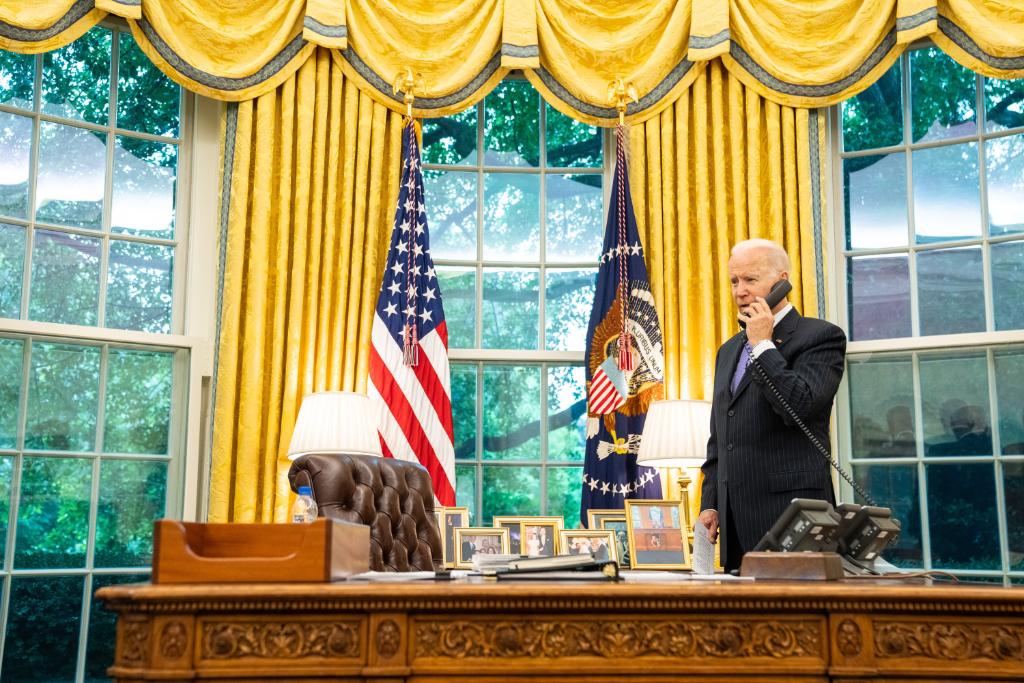Here are Biden’s latest ultratrumpian moves for US industry

More diplomatic than Donald Trump but just as determined, Joe Biden is running a vigorous “America first” campaign for industrial manufacturing. Le Monde article
Industrial Europe has its work cut out for China and the American steamroller – writes Le Monde . And it is said that the regulation on microprocessors drawn up in 2022 – the subject of an agreement reached on Tuesday 18 April between the EU 27 and the Parliament – will arrive in time to wrest the European Union (EU) from the grip of the United States and China . The objective of this plan is to reach 20% of the world market, that is to say double it in a few years, thanks to 46 billion euros of European funds, private capital and a relaxation of the rules on state aid.
The ambition is strong for a global market that could be worth $1.3 trillion (€1.19 trillion) by the end of the decade. "By mastering the most advanced semiconductors, the European Union will become an industrial powerhouse in the markets of the future", said Internal Market Commissioner Thierry Breton, who sees it as a tool to "rebalance and secure our supply chains". But times are tight. The EU will have to mobilize capital for research and development of the latest generation chips and start up production sites very quickly, such as those of the American Intel in Germany or the Franco-Italian STMicroelectronics in Crolles (Isère).
Across the Atlantic, the Biden administration doubled down on support for cleantech with two major laws passed in August 2022: the Inflation Reduction Act , which provides $369 billion in tax credits, loans and guarantees to manufacturers of batteries, solar panels and smart power grids, and the Chips and Science Act, which includes a $54 billion budget for electronic chips, essential components for the automotive, renewable energy, artificial intelligence and of the defence.
Biden's "America first" campaign
More diplomatic than his predecessor Donald Trump but equally determined, Joe Biden is leading a vigorous "America first" campaign and can take up the slogan "Make America great again". His policies are starting to bear fruit. In eight months, the United States has invested $204 billion (€186 billion) in semiconductor and low-carbon technologies, according to a Financial Times tally. They want to create jobs at all costs, revitalize abandoned territories and reduce their dependence on the Middle Kingdom for strategic products.
The British newspaper looked at investments worth more than 100 million announced between August 2022 and mid-April 2023. It identified 75 large factory projects that promise to create 82,000 jobs. Even if they are not all activated by recent laws, they should benefit from the aid. “This amount is almost double the capital announced in 2021 in the same sectors, and almost twenty times the 2019 level,” estimates the Financial Times. That year, only four projects were worth more than $1 billion; I'm 31 today.
The newspaper identified more than 30 investments to accelerate electric vehicle development and 21 related to microprocessors, a crucial area for Biden. On December 6, he visited the Taiwan Semiconductor Manufacturing Company (TSMC) site in Phoenix, Arizona, surrounded by members of Big Tech's elite, including Apple CEO Tim Cook. The investment of the largest microprocessor maker in the world will reach 40 billion dollars, a historic record for a foreign company. This is more than a ribbon-cutting ceremony,” said Brian Deese, the White House's chief economic adviser. It's about building an ecosystem in the United States” for these critical national security components.
Hunt for subsidies
A third of the $204 billion comes from foreign companies, mainly Japanese, Korean and Taiwanese. This relocation to the Pacific allows them to reduce their dependence on China, where their commercial and industrial presence is threatened by a serious geopolitical crisis, in particular by the risk of an invasion of Taiwan by its powerful continental neighbour. The South Korean LG Energy Solution will invest 5.5 billion in batteries in Arizona, Ford 2.4 billion in Michigan to produce batteries for the Chinese CATL, world leader in the sector, which will equip its vehicles. It is not excluded that Chinese technology could also invest.
Companies often refuse to disclose the amounts of aid obtained. The total volume of grants made public by their beneficiaries barely reaches 14 billion, notes the financial newspaper. Greatest help known? About 5.5 billion to the American company Micron for the 20 billion dollar chip factory planned in New York State, more generous than Texas in securing this gigantic factory. The hunt for subsidies is so rampant in the semiconductor industry that it raises the question of what "gigafactories" are interested in: won't they blow up local budgets?
For the head of the American Manufacturers Association, Scott Paul, who has long been a critic of successive governments' laxity towards China, this reshoring is "unprecedented for several generations". This move doesn't stop Republicans from being skeptical. In Congress they overwhelmingly voted against the Inflation Reduction Act and the Chips and Science Act, three-quarters of which currently benefit Grand Old Party districts.
(Excerpt from the press release of eprcommunication)
This is a machine translation from Italian language of a post published on Start Magazine at the URL https://www.startmag.it/mondo/joe-biden-politica-industriale-usa/ on Sun, 23 Apr 2023 05:11:33 +0000.
